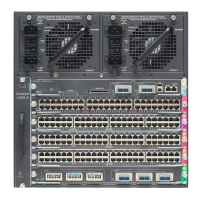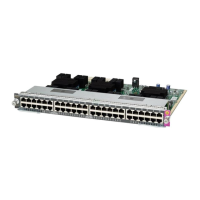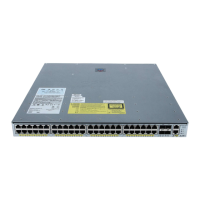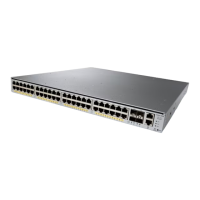11-2
Software Configuration Guide—Release IOS XE 3.6.0E and IOS 15.2(2)E
OL_28731-01
Chapter 11 Configuring Supervisor Engine Redundancy Using RPR and SSO on Supervisor Engine 7-E, Supervisor
About Supervisor Engine Redundancy
If a command is not in the Catalyst 4500 Series Switch Command Reference, you can locate it in the
Cisco IOS library. See the Catalyst 4500 Series Switch Cisco IOS Command Reference and related
publications at this location:
http://www.cisco.com/en/US/products/ps6350/index.html
About Supervisor Engine Redundancy
These sections describe supervisor engine redundancy:
• Overview, page 11-2
• RPR Operation, page 11-3
• SSO Operation, page 11-3
Overview
With supervisor engine redundancy enabled, if the active supervisor engine fails or if a manual
switchover is performed, the standby supervisor engine becomes the “new” active supervisor engine.
The standby supervisor engine has been automatically initialized with the startup configuration of the
active supervisor engine, shortening the switchover time (30 seconds or longer in RPR mode, depending
on the configuration; subsecond in SSO mode).
In addition to the reduced switchover time, supervisor engine redundancy supports the following:
• Online insertion and removal (OIR) of the supervisor engine.
Supervisor engine redundancy allows OIR of the redundant supervisor engine for maintenance.
When the redundant supervisor engine is inserted, the active supervisor engine detects its presence,
and the redundant supervisor engine boots into a partially-initialized state in RPR mode and a
fully-initialized state in SSO mode.
• Software upgrade. (See the “Performing a Software Upgrade” section on page 11-12.)
To minimize down time during software changes on the supervisor engine, load the new image on
the standby supervisor engine, and conduct a switchover.
When power is first applied to a switch, the supervisor engine that boots first becomes the active
supervisor engine and remains active until a switchover occurs.
A switchover will occur when one or more of the following events take place:
• The active supervisor engine fails (due to either hardware or software function) or is removed.
• A user forces a switchover.
• A user reloads the active supervisor engine.
Table 11-1 provides information about chassis and supervisor engine support for redundancy.
Table 11-1 Chassis and Supervisor Support
Supported Switches Supported Supervisor Engines
WS-C4507R-E, WS-C4510R-E,
WS-C4507R+E, WS-C4510R+E
Supervisor Engine 7-E (WS-X45-SUP7-E),
Supervisor Engine 7L-E (WS-X45-SUP7L-E),
and Supervisor Engine 8-E (WS-X45-SUP8-E)

